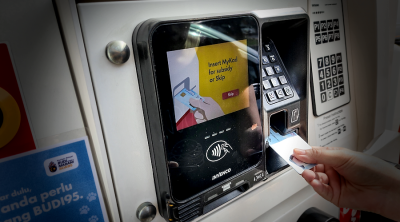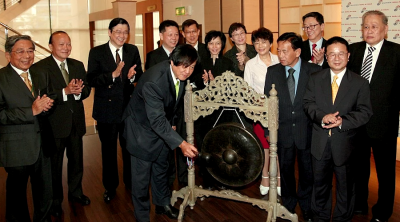
In a world where artificial intelligence (AI) continues to redefine industries and economies powerfully, Technology Innovation Park Malaysia (TiPM) stands at the forefront of driving innovation and empowering the nation’s AI future through critical initiatives and a holistic approach.
To strategically align with Malaysia’s aspiration of becoming a regional AI hub, TiPM aims to fortify Malaysia’s position in the global AI landscape by fostering innovation, entrepreneurship, and economic advancement through AI technologies, which also underscores TiPM’s continuous commitment to driving sustainable growth and competitiveness in the digital era.
TiPM’s vision for national AI development rests on the following essential building blocks:
■ AI Talent Cultivation: TiPM leverages the National Technology Innovation Sandbox (NTIS) programme and collaborates with NVIDIA to offer AI-focused upskilling and reskilling programs through the AI Sandbox Pilot Programme.
The aim is to empower the local workforce with essential AI knowledge, fostering over 13,000 new AI talents by 2026.
This aligns seamlessly with Malaysia’s National AI Roadmap 2021-2025, emphasising the development of a robust talent pool.
■ Start-up nurturing: TiPM’s AI Sandbox Pilot Programme also aims to nurture AI start-ups—a remarkable 900 of them by 2026.
This ambitious target, ten-fold the national goal of incubating 100 AI companies to generate RM1 billion in revenue by 2030, underscores this project’s immense scale and potential.
■ Strengthening national AI infrastructure and innovation ecosystem: TiPM’s AI Park, Malaysia’s first, is a vibrant hub for integrating diverse technologies.
As a centre of excellence, it bolsters innovation ecosystems in drones, robotics, and autonomous vehicles, supporting innovators, researchers, and companies in refining solutions within a controlled environment.
■ Global competitiveness: Our strategic partnership with NVIDIA vividly demonstrates TiPM’s unwavering commitment to equipping Malaysia’s workforce for the dynamic global AI landscape.
By bridging the divide between current practices and global industry standards, we empower our talent pool to stay competitive and thrive.
In other words, TiPM takes a holistic approach, acting as a bridge between AI research and industry implementation by fostering collaboration, talent development, and low-cost but high-impact practical solutions, helping industry players to integrate AI into their operations through the following:
■ Providing a platform for companies to experiment with AI technologies, develop prototypes, and explore practical applications;
■ Providing training, workshops, and upskilling programs to equip professionals with the necessary skills to implement AI effectively;
■ Offering physical spaces where industry representatives, start-ups, and researchers can collaborate for knowledge sharing, idea exchange, and joint projects related to AI;
■ Assisting companies in their AI research and development efforts—whether it’s exploring new algorithms, creating custom solutions, or optimising existing processes, TiPM provides guidance and resources to accelerate innovation;
■ Providing access to high-performance computing resources, cloud platforms, and AI hardware, which industry players can leverage to build and test AI models, ensuring scalability and efficiency; and
■ Conducting awareness campaigns, seminars, and conferences to educate industry stakeholders about AI’s benefits—by demystifying AI and showcasing successful case studies, we encourage adoption.
TiPM also tailors its support to specific industries
AI transformation is across industries, and some sectors have emerged as frontrunners in embracing this technology, such as information (IT); professional, scientific, and technical services; finance and insurance, and manufacturing, as can be seen from “The AI Index 2024”, annual report by Stanford University.
However, other key sectors poised to benefit massively from AI include agriculture, healthcare, and hospitality.
These sectors also play a pivotal role in maintaining Malaysia’s competitive edge within the region’s economy.
Malaysia’s agriculture sector requires revolutionary operational innovation, and AI can play a key role in this.
Additionally, healthcare exhibits significant potential, with approximately 22% of projects focused on adoption within this industry—making it a prominent player among Malaysia’s sectors.
Meanwhile, despite making significant strides in integrating AI into our digital transformation recently, Malaysia is still catching up with its regional peers.
China, for instance, has seen remarkable success due to its massive scale and extensive proof-of-concept trials that generate vast amounts of data for AI development.
According to “The AI Index 2024”, the United States still leads China, the EU, and the UK as the source of top AI models.
In 2023, 61 notable AI models originated from US-based institutions, far outpacing the European Union’s 21 and China’s 15.
However, according to the same report, China far outpaces other nations in AI patents. In 2022, China led global AI patent origins with 61.1%, significantly outpacing the United States, which accounted for only 20.9% of AI patent origins.
These might be the early signs that the centre of technology innovation leadership and power is indeed shifting to East Asia and the Pacific.
Close to our home, Singapore also demonstrates impressive AI readiness across different dimensions.
For example, in the Government AI Readiness Index 2023 by Oxford Insights, Singapore emerged as the global leader in government AI readiness, while according to the Asia Pacific AI Readiness Index 2023 by Salesforce, Singapore leads the APAC region with a score of 70.1, followed by Japan (59.8) and China (59.7). Malaysia (48.2) comes eighth in the region.
Notably, according to the later report, except for Singapore, all Southeast Asian countries—Indonesia, Malaysia, Thailand, the Philippines, and Vietnam—achieved scores below the APAC average in their overall AI readiness.
However, these nations have only recently introduced national AI policies and strategies (between 2021 and 2022)—Malaysia in 2021. Thus, we may soon witness the practical impact of these AI initiatives on businesses and government organisations.
However, there are very positive signs that Malaysia’s AI ecosystem might be just heating up, and Malaysia is progressing well in integrating AI and positioning itself as an AI hub in the region.
For example, according to the aforementioned Government AI Readiness Index 2023, Malaysia has been reported as a notable exception—a non-high-income country punching above its weight.
Malaysia’s overall score is 68.71, which is much higher than the average score of 43.69 for upper middle-income countries, and is ranked 23rd globally (an improvement from 29th in the 2022 index) and 6th in East Asia after such well-known AI-leading nations like Singapore, South Korea, Japan, China and Taiwan.
These rankings consider factors such as AI vision, policy, technology integration, and data accessibility.
According to Goldman Sachs Global Investment Research 2023, Malaysia is positioned higher than Taiwan in terms of the estimated impact of AI adoption on annual productivity growth over ten years, just below the global average.
Based on the Ipsos survey, 69% of Malaysian respondents view AI products and services as more beneficial than harmful, lower than Indonesia (78%) and Thailand (74%) but significantly higher than many Western countries, as highlighted in Stanford’s AI Index Report 2024.
Additionally, apart from NVIDIA, other major global tech players are showing interest in Malaysia’s AI potential, and Microsoft’s recent investment of US$2.2 billion to support the country’s digital transformation is a significant milestone.
Malaysia’s government has also announced a partnership with Google to train individuals in AI and data analytics at no cost, and the company is considering the creation of a Google data centre in Malaysia.
According to a study by IBM’s Institute for Business Value, nearly a third of surveyed companies in Malaysia have already integrated generative AI, and over 40% of ICT professionals report that their organisations are actively exploring the use of generative AI to drive business growth.
Malaysia does face challenges such as data privacy concerns, lack of skilled talent, and slow regulatory adaptation. Addressing these hurdles will be crucial for sustained AI growth.
Therefore, as our nation continues to navigate towards a future where AI transcends being just a technology to become a transformative force for progress, it is imperative that we steadfastly support and advocate for initiatives that propel Malaysia to the forefront of the global AI landscape.
By uniting in our efforts, we can leverage the potent combination of innovation, entrepreneurship, and talent development to pave the way for a brighter and more prosperous future for all Malaysians.
(Dr. Rais Hussin is the CEO of Technology Innovation Park Malaysia (TiPM), focused on making Malaysia a nucleus for innovation and leading technology producer nation.)
ADVERTISEMENT
ADVERTISEMENT






































